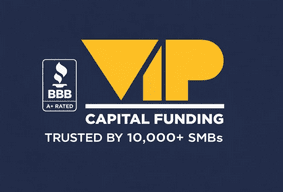Revenue-Based Funding Solutions for Pennsylvania Businesses

Revenue Based Funding
Overview of Revenue-Based Funding for Pennsylvania Businesses
Revenue-Based Funding (RBF) is a financial solution that offers flexibility for businesses in Pennsylvania. Unlike traditional loans, RBF allows repayment based on revenue cycles, providing ease during slower months and helping companies grow without rigid repayment schedules.
With over 1.1 million small businesses making up 99.6% of all Pennsylvania businesses, RBF is an ideal solution for those looking for flexibility in repayment schedules to match fluctuating revenue.
Want to explore how VIP Capital Funding’s RBF can help your Pennsylvania business thrive? Contact Us to learn more about flexible funding options tailored to your needs.

Why Choose VIP Capital Funding for Your Pennsylvania Business
At VIP Capital Funding, we understand the financial needs of Pennsylvania businesses and offer tailored solutions through Revenue-Based Funding. In 2021, large banks issued $4.1 billion in small business loans to Pennsylvania businesses with revenues of $1 million or less. VIP Capital Funding’s RBF can complement these funding options by providing even more flexible, revenue-aligned repayment solutions without the rigid constraints of traditional loans.
Here’s why you should choose VIP Capital Funding:
- Fast Approvals: Receive funding decisions in as little as 48 hours.
- Flexible Funding Amounts: Access capital ranging from $50,000 to $15,000,000.
- 95% Approval Rate: High chance of approval meeting your financial needs.
- Revenue-Aligned Repayments: Payments adjust with your business’s performance, making them more manageable during slow periods.
With VIP Capital Funding, Pennsylvania businesses can thrive with flexible and accessible financing solutions designed to support growth.

Benefits of Revenue-Based Funding for Pennsylvania Businesses
Revenue-Based Funding (RBF) offers numerous advantages to Pennsylvania businesses:
- No Fixed Repayment Schedules: Payments adjust based on monthly revenue.
- No Equity Dilution: Maintain full control of your business.
- Quick Access to Capital: Receive funds fast to capitalize on opportunities.
- Flexibility: Tailored solutions based on your cash flow.
- Scalability: Funding grows with your business needs.
- Cash Flow Friendly: Aligns with your revenue to reduce financial pressure.
- Risk Sharing: Aligns the lender’s interest with the business’s success.
In 2021, Pennsylvania businesses received $13.7 billion in loans of $1 million or less, emphasizing the demand for flexible financial solutions. RBF allows businesses to access capital while ensuring that repayments are manageable, even for those taking smaller loans.

How RBF Supports Pennsylvania’s Leading Industries
Revenue-Based Funding (RBF) is a dynamic financial tool that benefits Pennsylvania’s core industries, including manufacturing, healthcare, and technology.
Pennsylvania is home to 15,430 exporting firms, contributing $41.4 billion in export value in 2021, with 88.5% of those exporters being small businesses. By aligning with revenue cycles, RBF offers Pennsylvania’s exporting businesses the flexibility they need to navigate global markets while expanding their operations.
VIP Capital Funding ensures businesses across these industries can grow without financial pressure by aligning repayments with business revenue.

Easy Application Process for Pennsylvania Businesses
Simplify the way you secure funding with VIP Capital Funding, designed to get you through the application to approval swiftly:
1. Create Your Profile: Start by sharing basic business details to help us understand your financial needs.
2. Submit Your Application: Fill out your application by providing the necessary financial documents to assess your business.
3. Connect with a Specialist: A dedicated funding specialist will guide you to the most suitable financial solution.
4. Get Approved Fast: Expect a quick response—approval decisions typically within 24-48 hours.
This streamlined process ensures minimal disruption to your business operations, letting you focus on growth.

Hear From Our Clients
“VIP Capital Funding turned our seasonal struggles into opportunities for growth. Their tailored funding solutions allowed us to thrive throughout the year, adapting seamlessly to our business cycle.”
— James H.
“The efficiency and support from VIP Capital Funding were outstanding. They handled our application quickly, and their financial advice has been crucial to our business’s growth.”
— Sarah E.

Frequently Asked Questions (FAQs)
Feel free to connect with us for more personalized answers tailored to your business’s specific needs.
Your Path to Unrestricted Growth Starts Here
Unlock the potential of your Pennsylvania enterprise with VIP Capital Funding. Our unique Revenue-Based Funding model ensures you maintain control over your business operations without diluting your equity.
Pennsylvania was ranked #15 in America’s Top States for Business in 2023. With a GDP of $915 billion, Pennsylvania is the most economically diverse state in the country. VIP Capital Funding ensures businesses in this dynamic environment have access to the flexible financial solutions they need to thrive.
Ready to propel your business forward without the constraints of traditional funding methods? Apply today!


